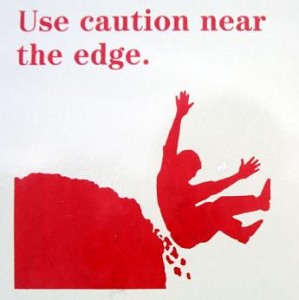This post is about words, themes, change, and claims of change. It is about a recurring phenomenon in the U.S. (and I suspect across the world) that I call the “Generational Change Tsunami.”
 You see, each generation thinks they’re going to fundamentally change things. Here we come folks. We’re different. We’re in charge. And we’re going to change EVERYTHING.
You see, each generation thinks they’re going to fundamentally change things. Here we come folks. We’re different. We’re in charge. And we’re going to change EVERYTHING.
Every generation says so. I think they’ve got to. Otherwise, why get out of bed? We went through the existential era. That wasn’t fun. It gave us books titled “Nausea”.
So let’s take stock of the GCT track record. Going in reverse order.
- In the 1990s Clinton promised us a “Third Way.” A lot of it worked — we actually at one time had a budget surplus — but now we’re at record deficits.
- In the 1980s Reagan offered us “Morning in America”. We grew, rebuilt our military, the wall came down and now Russia is back with a vengence.
- In the 1960s and 1970s it was the “peace generation” whose protests actually stopped a war (no mean feat at the time) and today we’ve got not one (1) but two (2) wars — in Iraq and Afghanistan.
- Or how about going way back to the 1930s and the temperance movement. Back then we actually made heroes (Elliot Ness) out of people who destroyed beer. Today alcohol consumption is at an all time high.
 I don’t say all this to get anyone depressed. And despite the above I actually buy into the “change” mantra of Barack and Joe. But the history of failed predictions and failed promises should give one pause when picking up books like Jeff Gordinier’s “X Saves the World” or Zogby’s “The Way We’ll Be.”
I don’t say all this to get anyone depressed. And despite the above I actually buy into the “change” mantra of Barack and Joe. But the history of failed predictions and failed promises should give one pause when picking up books like Jeff Gordinier’s “X Saves the World” or Zogby’s “The Way We’ll Be.”
Godinier’s title is audacious enough. Xers will save the world? Really? But the subtitle gently modifies what “saving” means — “How Generation X Got the Shaft but Can Still Keep Everything from Sucking.” The hero of this play is, of course, our Xer candidate Barak Obama. In an interview with John Avalon of NewGeography, Gordinier comments:
“Obama’s talk about going beyond the old politics of ‘red’ and ‘blue’, liberal and conservative, and building a third way does resonate. Gen Xers tend to be pretty post-ideological, there is less allegiance to any one party or any one way of thinking. … Our political pragmatism comes as a result of growing up in the shadow of the Boomers’ idealism and seeing it fail miserably.”
I guess as a boomer I should take offense. No, I should be depressed. Our X’er children view our idealism as a failure. That’s ok. I can live with that.
But “keeping the world from sucking” is neither an effective rallying cry nor is it as realistic or pragmatic as Gordinier thinks. The world will always suck — at least for someone somewhere. And for every significant achievement in societal development (women’s rights, race relations) we know that it wasn’t one (1) generation that made a difference — it was multiple generations all coalescing around one idea.
Then there’s Zogby’s book with an equally audacious title, “The Way We’ll Be.”
Really? Are you talking about me? Do I know you?
I like Zogby’s stuff because he reaches. And there is no shortage of entertainment in his unique (and sometimes even insightful) look at attitudes and behaviors. A recent favorite: an analysis of the 2004 voting prerference based on folks shopped.
Godinier believes that the next revolution will be generational. Zogby agrees but casts that in a framework where the true tectonic shifts are techonlogical and structural:
Spearheaded by today’s eighteen-to-twenty-nine-year-olds–the “First Global” generation–Americans are becoming more internationalist, consensus-oriented, and environmentally conscious and less willing to identify themselves by the things they do to earn or spend their money. But this is more than a youth tide. Americans of all ages are moving beyond old divides–red state/blue state, pro-life/pro-choice, beer drinker/wine connoisseur–to form a new national consensus that will shape the nation for decades to come.
The phrase that sticks out to me is “less willing to identify themselves by the things they do to earn or spend their money.”
Sorry. I look around and I just don’t see it.
In the end I side with Joe Queenan who wrote in his review in the New York Times:
A dominant theme of his book is that mean old white men who drive big cars are a spent force. I only wish this were so; for quite some time I’ve been thinking of cleaning out my desk and heading for the exits now that society no longer needs me. But as my wise old mentor, the Barron’s editor and columnist Alan Abelson, used to remind me, the con man’s favorite pitch line is: “This time it’s different.”
I believe in the change thing. But I have no illusions.
Egads! I think I’m becoming an Xer!
 Guess who opposed bailing out the auto industry? It was … General Motors! Then GM Chairman Thomas Murphy condemned the Chrysler bailout in 1979 as “a basic challenge to the philosophy of America.”
Guess who opposed bailing out the auto industry? It was … General Motors! Then GM Chairman Thomas Murphy condemned the Chrysler bailout in 1979 as “a basic challenge to the philosophy of America.”










